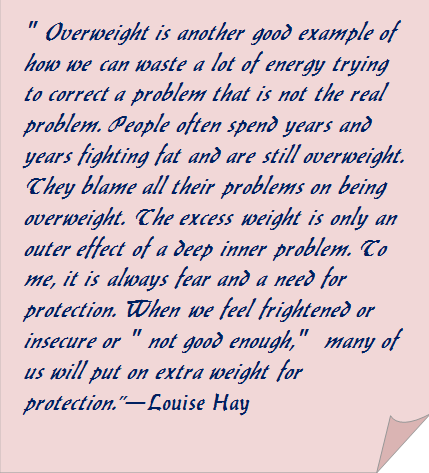 If you struggle with your weight, then you have probably already tried several things to lose it. Apparently nothing has helped so far long-term. In other words, by now you have probably found out by yourself that dieting may not be the solution. But what is the solution for weight issues?
If you struggle with your weight, then you have probably already tried several things to lose it. Apparently nothing has helped so far long-term. In other words, by now you have probably found out by yourself that dieting may not be the solution. But what is the solution for weight issues?
Before I or anybody can give you a helpful answer we first have to look at another topic.
A few months ago I had to spend a month in a rehab clinic after a surgery. That clinic is specialized on vein and lymphatic problems. That was very interesting for me because over 80% of all patients in that clinic are obese.
While my physical therapist was working at my body we talked a lot, mainly about health and weight topics. Since most of her patients are obese I asked her one day, why, in her opinion losing weight is so difficult. Her answer was very interesting.
To be honest, from her I expected to hear an answer like, “Obese women eat too much.” “Obese women don’t like to exercise.” “Obese women have poor eating habits.” But to my big surprise she said that the single and most relevant reason for that issue was that overweight and obese people fail to look at the psychological causes. She added, “As soon as overweight people take care of their causes, they can lose weight.”
FINALLY another person who has come to the same conclusion I have! To hear this from an expert who treats 40 patients every week what makes about 1,800 patients per year meant a lot for me.
Of course, that physical therapist and I are not the only professionals who understand the connection between weight gain and psychological issues. In fact, we are in the best possible company (unfortunately that doesn’t mean that people would listen and understand).
Louise Hay lists four possible causes of being overweight:
- Fear – the need for protection
- running away from feelings
- insecurity, self-rejection
- seeking fulfillment
This alone should give you a better idea of the complexity of weight issues.
In my 32 years of working with 10,000+ weight-struggling women I have found over 50 possible causes so far. 47 of them I have listed in a report with the title Why You Can’t Lose Weight for Good – Possible Causes of Weight Gain and Yo-Yoing.
There is one simple reason why diets don’t work:
No diet or program will ever work until you will have recognized and eliminated the real cause or causes!
When we think about possible causes of weight gain we usually think about things like over-eating, lack of  exercise, hormonal imbalance, lack of discipline…. But that’s only a tiny, tiny part of the whole picture.
exercise, hormonal imbalance, lack of discipline…. But that’s only a tiny, tiny part of the whole picture.
Let’s not forget that we are whole beings. We are not our body – we have a body. That is a bigger difference than you may believe. We not only have a physical body of cells, but also finer “bodies” made of atoms, molecules, and electrons. These parts of us are invisible but not less important. The body – or the physical part – is pretty much just like the tip of the iceberg.
Our way of thinking has a tremendous effect on our healthy, our weight, our finances…our whole life. Then, of course, we also have emotions. Emotions and thoughts combined have a very powerful creative effect. The thinking, feeling and acting patterns we repeat over and over become habits which have an enormous impact on our weight. And then we have memories (conscious and subconscious). All these parts of the human being make us the individual we are, and they affect our body, our weight and our health.
One of the reasons why diets don’t work long term is the fact that people only look at the physical body and completely ignore the rest of the human being. The physical and visible part of our being is only a very little part of the problem. Therefore, a diet or any program that ignores the mental, emotional, and psychological part of the issue can never bring long-term results. We can’t ignore 90% of the problem and focus on the 10% and seriously hope that this will solve the problem.
In fact, over-eating is most of the time just a symptom; the real cause of weight gain is usually something else, for instance a hunger for life, for love, for recognition, for improvement. Unfortunately these issues are not often recognized and not taken into consideration for a sustainable weight loss strategy.
No matter how many diets you follow, how determined and disciplined you count calories, how many sacrifices you make, your weight will always bounce back if you don’t take care of the real, underlying causes of your weight problem. When these causes are being ignored for too long, they can add up quite a bit and make your attempts to lose weight more and more difficult with each year.
On th eother hand, simply resolving or eliminating the cause will often bring the desired results without even changing the diet or exercise regimen.
Here are nine examples of what a psychological cause of excess weight or obesity in women can be .
 Example #1: After entering a romantic relationship with a partner, Bertha identified even more strongly with her role as a woman. Consequently, she developed a more feminine form. These curves have an erotic appeal. Her body reacted quite naturally to the new situation. If Bertha had recognized the reason behind the slight weight gain, and responded properly (accepted her body and enjoyed her femininity), her weight would not have increased more than a few pounds if she wouldn’t have started yo-yo dieting.
Example #1: After entering a romantic relationship with a partner, Bertha identified even more strongly with her role as a woman. Consequently, she developed a more feminine form. These curves have an erotic appeal. Her body reacted quite naturally to the new situation. If Bertha had recognized the reason behind the slight weight gain, and responded properly (accepted her body and enjoyed her femininity), her weight would not have increased more than a few pounds if she wouldn’t have started yo-yo dieting.
Example #2: Jessica did not have a steady boyfriend for a long time before she met her husband. Her marriage now gives her peace, quiet, safety, and security. This settled lifestyle gives her a sense of comfort – she is content, so to speak. Jessica’s body reacts to this peace, as she relaxes about everything. Her body gains a little weight. With that, her body signals to other men: “I am at home, I am not available anymore.”
 Example #3: Erica’s self-esteem is very low. She feels that she must somehow be happy now that she has found a husband. But, in her deepest heart stirs something else – for Erica, yet unnoticed. But this part deep within herself is strong and self-confident and knows that there is no reason for those feelings of inferiority. Yet, because she has learned as a child that she was only loved because she was cute and well behaved, something starts to rebel within her. What if her husband just loved her too because she’s pretty, nice and “low maintenance”? So now, she needs to (unconsciously, because she is not aware of all this) find out. By gaining weight, she is suddenly not so cute and attractive anymore, no longer the sweet little girl. In this way, Erica wants to “test” her husband and find out if he really loves her or just her outer appearance.
Example #3: Erica’s self-esteem is very low. She feels that she must somehow be happy now that she has found a husband. But, in her deepest heart stirs something else – for Erica, yet unnoticed. But this part deep within herself is strong and self-confident and knows that there is no reason for those feelings of inferiority. Yet, because she has learned as a child that she was only loved because she was cute and well behaved, something starts to rebel within her. What if her husband just loved her too because she’s pretty, nice and “low maintenance”? So now, she needs to (unconsciously, because she is not aware of all this) find out. By gaining weight, she is suddenly not so cute and attractive anymore, no longer the sweet little girl. In this way, Erica wants to “test” her husband and find out if he really loves her or just her outer appearance.
Example #4: Even though Mary is very faithful to her husband, he tortures her again and again with jealousy. These outbreaks are very tiring to her, especially since she feels helpless and powerless against the allegations of her husband. She notices that no logical reasoning helps here. She wishes deeply that other men would not look at her that way, so her husband would have no reason to be jealous. Because she loves her husband very much, but knows no way out, her subconscious mind finds a solution. It causes the body to increase her weight and so lose its attractive appeal. From then on, Mary feels satisfaction and peace, as she is no longer noticed by other men. That way, her husband no longer has any reason for jealousy. However, the price is very high, because he finds her new appearance no longer particularly appealing either. Well, you can’t please everyone!
 Example #5: Ruth has learned as a child, that she must not say “no,” or she would be punished. At the same time, she received from her mother the message that somehow, she should fulfill her conjugal “duties” with her husband. Now that she is married, she feels the sexual desires of her husband are often too demanding. Although she enjoys the sex, she is not always ready. Since she has never learned to say “no” verbally and she cannot stand up to her husband, her body says “no” in her behalf. She builds up a protective armor, so to speak, and gains weight.
Example #5: Ruth has learned as a child, that she must not say “no,” or she would be punished. At the same time, she received from her mother the message that somehow, she should fulfill her conjugal “duties” with her husband. Now that she is married, she feels the sexual desires of her husband are often too demanding. Although she enjoys the sex, she is not always ready. Since she has never learned to say “no” verbally and she cannot stand up to her husband, her body says “no” in her behalf. She builds up a protective armor, so to speak, and gains weight.
 Example #6: Norma’s situation is similar to Ruth’s. She has not learned to say no. On the other hand, she enjoys her body and sexuality. Before she married, she was quite free and could choose her lovers. But now she is only “reserved” for one man. To Norma’s mind it is quite clear that she wants to be faithful, but somehow she has difficulty getting used to the idea of having only one man in her life. She doesn’t trust herself completely. So she gains weight to keep men away. Again, the overweight serves as protection from male harassment on the one hand, and as protection from her own unconscious desires and feelings on the other.
Example #6: Norma’s situation is similar to Ruth’s. She has not learned to say no. On the other hand, she enjoys her body and sexuality. Before she married, she was quite free and could choose her lovers. But now she is only “reserved” for one man. To Norma’s mind it is quite clear that she wants to be faithful, but somehow she has difficulty getting used to the idea of having only one man in her life. She doesn’t trust herself completely. So she gains weight to keep men away. Again, the overweight serves as protection from male harassment on the one hand, and as protection from her own unconscious desires and feelings on the other.
Example #7: When Isabelle met her husband, he courted her intensely at first. He spoiled her with flowers, presents, caresses and compliments, and he called her every day. Isabelle interpreted this behavior as the great love of her life, and said yes to his marriage proposal. But as soon as they were married, the flowers, gifts and other tokens of love stopped. Isabelle believes that her husband no longer loves her. She misses the regular vows of love and affection from him. What’s more, increasingly, he is tense and busy with his professional career. While day after day she is sitting at home alone, bored as a housewife, Isabelle experiences increased cravings for sweets. For her the eating substitutes for love. And then something else happens. Her increased physical size, too, can no longer be ignored, which means that her husband has to notice her more now – she can’t be ignored as easily anymore.
 Example #8: Rosmarie has been taken advantage of throughout her whole life. She is by nature a giver, and many people she met took advantage of her, including her family. This caused an imbalance between giving and receiving in her system. As an adult she had the constant feeling of coming short…she feels cheated by life. Therefore she also has the impression that life owes her something. On the physical level this results in constant hunger. At the same time she became very demanding. Often she felt so empty that to others she was like a big black whole that could take and take. In Switzerland we have a saying that goes like this: “She can’t get the throat full.” What that means is that such a person wants more and more and more, even if she can’t handle all that she receives. These people are takers in the truest sense of the word. Their throat can never be filled – it’s like a black, empty, bottomless pit. This is in most cases due to a lack of love in their childhood or other experiences of a lack of something. This can be food, but it’s mostly love and affection. Rosmarie’s way of giving and receiving is not balanced.
Example #8: Rosmarie has been taken advantage of throughout her whole life. She is by nature a giver, and many people she met took advantage of her, including her family. This caused an imbalance between giving and receiving in her system. As an adult she had the constant feeling of coming short…she feels cheated by life. Therefore she also has the impression that life owes her something. On the physical level this results in constant hunger. At the same time she became very demanding. Often she felt so empty that to others she was like a big black whole that could take and take. In Switzerland we have a saying that goes like this: “She can’t get the throat full.” What that means is that such a person wants more and more and more, even if she can’t handle all that she receives. These people are takers in the truest sense of the word. Their throat can never be filled – it’s like a black, empty, bottomless pit. This is in most cases due to a lack of love in their childhood or other experiences of a lack of something. This can be food, but it’s mostly love and affection. Rosmarie’s way of giving and receiving is not balanced.
 Example #9: Living with step-family, Linda has always been the black sheep of the family. Whenever somebody did something wrong, Linda was the one who was blamed. She was blamed for every fight and conflict in the family. There were many problems and a shameful history in Linda’s family, all of which were carefully swept under the carpet. By passing on the responsibility to Linda, the family could live with their blind spots quite comfortably. This allowed them to project everything negative onto Linda, rather than confront what needed to be changed in themselves. Instead, they could fault her and fight her. It was easier this way. They had singled out the “guilty” one. This is how Linda learned very early in her life, to carry other people’s problems on her shoulders. This pattern continues, not only within her family, but also with her friends and acquaintances. She takes the blame for problems and conflicts immediately and kind of automatically on herself – it has become her nature; it takes place on an entirely unconscious level. She has never learned to question whether others might also have their share of blame in a dispute or issue, or even realize that others tended to project their problems onto Linda. More and more, she felt like she was carrying the weight of the whole world on her shoulders. She could hardly breathe and felt depressed and immobile, like she was carrying a big, invisible burden. Her overweight condition simply reflected her role as a scapegoat. It also gave her the strength to be able to carry the burdens that were not hers. In the truest sense of the word, she needed broad shoulders in order to be able to carry all that.
Example #9: Living with step-family, Linda has always been the black sheep of the family. Whenever somebody did something wrong, Linda was the one who was blamed. She was blamed for every fight and conflict in the family. There were many problems and a shameful history in Linda’s family, all of which were carefully swept under the carpet. By passing on the responsibility to Linda, the family could live with their blind spots quite comfortably. This allowed them to project everything negative onto Linda, rather than confront what needed to be changed in themselves. Instead, they could fault her and fight her. It was easier this way. They had singled out the “guilty” one. This is how Linda learned very early in her life, to carry other people’s problems on her shoulders. This pattern continues, not only within her family, but also with her friends and acquaintances. She takes the blame for problems and conflicts immediately and kind of automatically on herself – it has become her nature; it takes place on an entirely unconscious level. She has never learned to question whether others might also have their share of blame in a dispute or issue, or even realize that others tended to project their problems onto Linda. More and more, she felt like she was carrying the weight of the whole world on her shoulders. She could hardly breathe and felt depressed and immobile, like she was carrying a big, invisible burden. Her overweight condition simply reflected her role as a scapegoat. It also gave her the strength to be able to carry the burdens that were not hers. In the truest sense of the word, she needed broad shoulders in order to be able to carry all that. Some of these examples may sound familiar to you and others don’t. That’s normal. Not every woman has the same causes.
Some of these examples may sound familiar to you and others don’t. That’s normal. Not every woman has the same causes.
These examples may just give you a better understanding of the real and quite complex nature of being overweight. These are still just a few examples and a very small part of the problem. Now, just imagine that you wanted to remedy all these issues with one tactic: a diet. You instantly realize what a ridiculous attempt this would be.
But what is the solution?
Very simple.
Weed out the roots first
If we want to make lasting changes and become slim and healthy for good, we have to get to the roots of the problem and weed them out. As soon as these underlying causes can be resolved, there is no reason for the body to stay overweight and it begins to burn more fat.
This may sound very complicated, but it isn’t. The only crux is that in most cases the overweight person needs an expert who is not only familiar with the possible causes but can also lead her through the transformation process. Sometimes there is a lot to weed out before the body can stop the symptoms.
This doesn’t mean that you have to go through 10 years of psychotherapy or through a very painful transformation process. Most of the time we can transform even the biggest and worst causes within 1 and 3 weekly group coaching calls. Frankly, there is no faster, easier and more efforless weight loss method out there I know of.
I personally do that kind of transformation work through one-on-one coaching and group coaching sessions over the phone. Once the real cause (or causes) has been detected and transformed, the body has no more reason to hold on to its extra fat and can begin to burn it.
Here is a short interview with Deepak Chopra on “hunger”.
There is one major reason why it’s highly recommended to take care of extra weight and eliminate the causes right away. And this is something else hardly anybody else tells you.
The longer you are overweight and the more often your weight bounces back and forth, the more your body creates what is called lipedema.
Lipedema overgrowth of fat cells that occur in the legs and lower trunk. In many cases it also includes the arms or upper body as well. Lipedema is often thought to be simple obesity. Don’t confuse lipedema with “lymphedema,” the accumulation of lymph fluid in the interstitial areas, though.
What makes lipedema a big problem is the fact that in such fat tissue hormones are created that force the body to create even more of these fat cells. That way lipedema can grow pretty much in every direction and to this day no cure has been found.
The very best and least painful way to lose your extra weight for good is really toeliminate the causes ASAP.
Allow me just one final word.
Everybody wants to lose excess weight fast and effortless. Here is the most important weight loss secret:
Eliminating the causes is by leaps and bounds the fastest, easiest and most effortless way of losing weight. Period.
Happy slimming!



